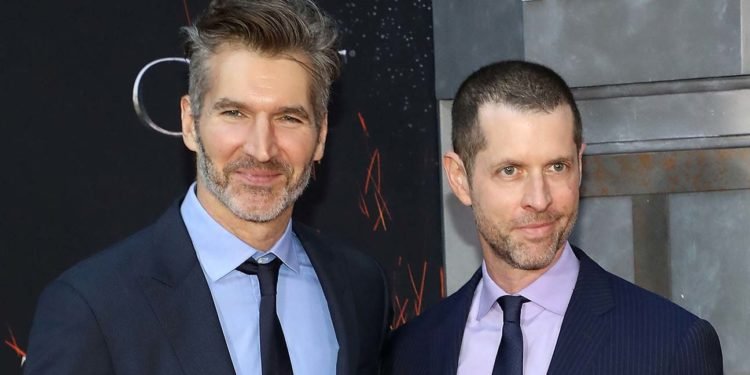Some speculated the exit had to do with a rare public appearance the duo made over the weekend at the Austin Film Festival, where they were candid about the mistakes they made during their Game of Thrones reign, and how they had to learn on the job. Others were surprised that it was Benioff and Weiss’ trilogy and not the other one in the works, from The Last Jedi writer-director Rian Johnson (who is also in fan crosshairs), that was being shelved.
Benioff and Weiss said Monday that they were caught in the push-and-pull that came with juggling one of the world’s biggest movie franchises and the $250 million Netflix deal they signed in August. “There are only so many hours in the day, and we felt we could not do justice to both Star Wars and our Netflix projects. So we are regretfully stepping away [from Star Wars],” read their joint statement.
While there is some truth to their stated reason for parting ways with Lucasfilm, insiders say there is more nuance to the story.
Sources tell The Hollywood Reporter that Benioff and Weiss’ exit has been brewing since August. Lucasfilm chief Kathleen Kennedy is said to have been unhappy with the Netflix deal, inked just as they were scheduled to begin work on Star Wars. (Benioff and Weiss had said multiple times that they would not turn their focus to Star Wars until production wrapped on the final season of Thrones, which ended in July 2018.) Kennedy was not convinced the pair — known for focusing on one project at a time — could develop a sci-fi trilogy while also overseeing film and TV projects at Netflix. Sources say that as the duo shopped for an overall deal over the summer, they told potential suitors that they planned to work on Star Wars concurrently with any projects under their new deal.
Sources say Netflix learned of Benioff and Weiss’ Star Wars departure mere days before news broke Monday.
Benioff and Weiss’ departure also marks the latest in what has become a tenuous relationship between Netflix and Disney. Sources say Disney was among the early meetings the Thrones pair had for an overall deal, though the Mouse House did not make it to the final round. (Amazon was a frontrunner before Netflix swooped in.) Disney famously severed ties with the streamer years ago when it began pulling back its Marvel movies as it prepared its own Disney+ streaming service. Disney networks more recently began rejecting advertising from Netflix.
Representatives for Disney, Lucasfilm, Netflix, and Benioff and Weiss declined to comment for this story.
While Benioff and Weiss were in high demand after wrapping the megahit Thrones — controversial final season notwithstanding — nine-figure deals such as theirs have traditionally been reserved for prolific producers who can manage multiple projects at once. (Netflix, for example, paid Ryan Murphy $300 million over five years, and he’s working on 10 projects less than two years after signing the deal.) Benioff and Weiss, for their part, have never tackled anything other than Game of Thrones and have effectively only made 73 episodes of television over the past decade. (It’s also worth noting there was a nearly two-year delay before the abbreviated final season aired, the longest stretch the show was ever off the air.)
Many TV industry insiders at the time questioned why Netflix would spend $250 million to be in second position to Star Wars. But sources familiar with the deal say Netflix and Disney were in a shared first position, meaning the duo could work on both simultaneously. Before signing the deal, Netflix was briefed on the Star Wars plans and wasn’t worried about having to wait for them to finish a potential trilogy — earmarked for 2022, 2024 and 2026. “It’s not going to be 10 years [until] Netflix sees their first output,” one source said, adding that Benioff and Weiss “have a lot of ambition.”
At the time of the Netflix pact, Benioff and Weiss were working on a treatment for Disney and Lucasfilm. The pair was committed to penning at least one of the films though the original deal was to write all three.
“They’re deep-dive guys,” says one person in their orbit. Adding to the wrinkle was that, according to one source, the Netflix deal required them to be exclusively on the sets of the projects they created during production, and not be away for Star Wars at the same time.
Kennedy, according to a source familiar with her thinking, was nervous. The duo would become the fourth directors to exit a Star Wars project since she took the helm of Lucasfilm. Josh Trank was fired from a Star Wars stand-alone movie in 2015; Chris Miller and Phil Lord was canned from Solo: A Star Wars Story mid-production in June 2017 and, that same year, Colin Trevorrow departed Episode IX, replaced by J.J. Abrams. Production under Kennedy has also run into trouble, with Tony Gilroy brought in to reshoot and rewrite much of Gareth Edwards’ 2016 stand-alone Rogue One, and Ron Howard stepping in after Lord and Miller’s departure from Solo to finish the project.
When THR exclusively reported last month that Marvel Studios’ Kevin Feige, the architect of Disney’s multibillion-dollar Marvel Cinematic Universe, will be working with Kennedy on a Star Wars movie, some speculated that the move was an acknowledgement that not all is well in the Star Wars universe. For their part, Disney co-chairmen Alan Horn and Alan Bergman continue to stand by Kennedy. “With the close of the Skywalker Saga, Kathy is pursuing a new era in Star Wars storytelling, and knowing what a die-hard fan Kevin is, it made sense for these two extraordinary producers to work on a Star Wars film together,” the studio chiefs said in a statement.
Meanwhile, Benioff and Weiss were also feeling the heat and began having second thoughts about jumping into Star Wars due to what one source described as “toxic fandom.”
The creators had built Thrones from the ground up — based on author George R.R. Martin’s sprawling novels — and were initially lauded by both critics and fans, who made the show HBO’s most watched original series ever. But the divisive six-episode final season that aired in the spring was met with such backlash that the duo backed out of a farewell panel at San Diego Comic-Con in the summer.
To go from Thrones to Star Wars, where fans have bullied actors off social media and taken aim at filmmakers like Johnson? “Who wants to go through that again? Not them,” notes another source with knowledge of Benioff and Weiss’ thinking. “This was in the ‘Life’s Too Short’ category.”
Whether forces internal or external were in play, Benioff and Weiss wanted out. “It was a hard quit,” says an insider.
It was a different scene when Kennedy brought Benioff and Weiss into the Star Wars galaxy, three months before the underwhelming performance of Solo in May 2018 led Disney and Lucasfilm to re-evaluate its strategy and abandon its stand-alone film ambitions, meaning a number of projects in the pipeline had to be revamped or killed. Abrams’ The Rise of Skywalker, with its December release, closes the 40-year saga that began with Lucas’ Star Wars: A New Hope in 1977.
Earlier this year, Kennedy met with Benioff, Weiss and The Last Jedi director Johnson — whose own trilogy will explore new realms in the Star Wars universe — to plot the next decade of films. With half those plans now blown up like the Death Star, sources say the Lucasfilm head is actively looking to enlist new filmmakers.
Although Disney and fans might hope for Feige’s touch to come to Star Wars sooner rather than later, it’s unlikely the Marvel executive’s feature will be moved into that December 2022 slot that was once carved out for Benioff and Weiss. Feige, who was recently promoted to expand his oversight to include television as well as film and other creative parts of the comic book powerhouse, will next launch a massive slate of MCU TV spinoffs for Disney+, which launches Nov. 12.
The question many are asking is if Lucasfilm will look beyond white male talent for its film future. Disney+ series The Mandalorian, created by Jon Favreau, boasts a more inclusive roster of behind-the-screen talent than the franchise’s big-screen installments have so far, and Kennedy has said she’s dedicated to being inclusive behind the camera as well as in front.
One underlying problem Benioff and Weiss’ exit illustrates, one source notes, is that there is still no consensus as to what Star Wars is and what Star Wars should be. Disney CEO Bob Iger said there would be a “slowdown” of Star Wars on the big screen, and Lucasfilm shelved a planned Obi-Wan Kenobi movie in favor of making it a Disney+ streaming series, while a planned Boba Fett movie from filmmaker James Mangold was also put on ice. For now, the immediate future of Star Wars will be on the small screen, with Disney+ launching The Mandalorian as its flagship show. In addition to an Obi-Wan series, a Diego Luna-led Rogue One prequel is also in the works.
Unlike Marvel, which has had a clear vision of its cinematic universe, Star Wars has had trouble finding its footing. Johnson took big swings with the mythos in The Last Jedi, and while the film was welcomed by critics and some fans, he was batted down by a vocal portion of the Star Wars community.
“This stuff needs to be sorted before it gets to a cataclysmic point,” says the source.
Additional reporting by Kim Masters and Aaron Couch
























































